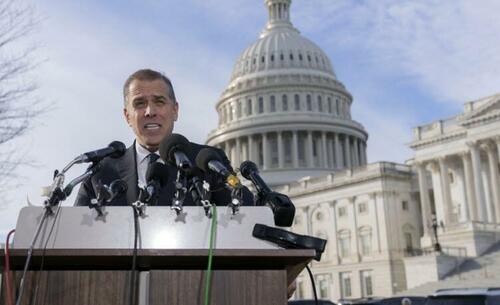
Below is my column in The Messenger on the decision of Hunter Biden to defy Congress in a press conference outside of the Capitol Building. Remarkably, this spectacle was coordinated by Rep. Eric Swalwell (D., Cal.) who presumably knew that Biden was going to violate the congressional subpoena. So Swalwell (a former impeachment House manager) helped facilitate a possible criminal act in refusing to share appear in an impeachment inquiry.
Here is the column:
Congress is often a theater of the absurd, from Rep. Jamaal Bowman (D-N.Y.) pulling a fire alarm before a major vote to former Rep. George Santos (R-N.Y.) being, well, a member of Congress at all. However, none of that compares to what unfolded on Wednesday as Hunter Biden stood outside Congress and defied a subpoena as being “beyond the absurd.” What happens next could be even more bizarre.
Hunter was under a subpoena from the House Committee on Oversight and Accountability to appear for testimony. As I previously wrote, he had two choices: He could appear and either testify or invoke his right to remain silent. The only thing that he could not do is what he did — just refuse to go into the hearing room. Yet, there he was, with counsel Abbe Lowell by his side, holding forth with a public press conference while refusing to appear in the closed-door deposition being held in the building behind him.
By staying on the Senate side of the Capitol, Hunter guaranteed that the House sergeant at arms did not pull him into the hearing room. Ironically, that would have been a better option than his blowing a raspberry at the committee and then speeding away.
Many pundits immediately claimed this was a clever move because the subpoena was not really enforceable until the House voted on the formal impeachment inquiry a few hours later.
I disagree. As I noted in my testimony in the first impeachment inquiry, there is no requirement for a formal vote to initiate an impeachment inquiry. Indeed, that is precisely what then-majority Democrats did with the impeachment of then-President Donald Trump. While I encouraged the House to hold a formal vote on the inquiry, it is not constitutionally required.
Moreover, this is an oversight committee which has independent authority to issue subpoenas. The subpoena was issued not only by the Oversight Committee but by the Judiciary Committee. It was issued under three different authorities, including Rule 12(g) of the Oversight Committee which allows for subpoenas “in the conduct of any investigation or activity or series of investigations or activities within the jurisdiction of the Committee.”
In holding this spectacle, Biden and his legal team committed another unforced error. This one could prove as costly as pushing for an obscenely generous plea agreement and then telling prosecutors to “rip it up” in July.
Few people expected Hunter to testify in the deposition. The evidence against him is overwhelming, as shown in his second federal indictment on tax charges. He and his uncles were allegedly engaged in one of the largest influence-peddling operations in history involving millions of dollars from various foreign sources. Hunter simply could have done what prior witnesses have done: Go in and take the Fifth. That is what attorney and former IRS official Lois Lerner did — twice — when House Republicans wanted to ask her about the Obama administration targeting conservative groups.
It was a no-brainer that someone appears to have radically over-thought on the Hunter Biden legal team.
Hunter can now be held in contempt of Congress. That will force the hand of Attorney General Merrick Garland, who aggressively pursued Trump figures for contempt, including former Trump adviser Steve Bannon. Despite some of us writing to the contrary, Bannon claimed his lawyers told him he did not have to appear before a House committee. He was swiftly charged and convicted by Garland’s prosecutors.
In this instance, the contempt case would go to the U.S. Attorney in D.C., Matthew Graves, who previously declined to assist in bringing tax charges against the president’s son. Yet by pulling a Bannon, Hunter now faces the expectation in many circles that he will get the full Bannon treatment from Garland.
There is another possible cost to this move. Fox News quoted White House press secretary Karine Jean-Pierre saying that President Biden “was certainly familiar with what his son was going to say,” which suggests that the president spoke with his son before his act of contempt and discussed his statement. If that is true, it was a breathtaking mistake. One of the four most obvious potential articles of impeachment that I laid out in my prior testimony was obstruction. There already are questions over special treatment potentially being given to Hunter in the form of alleged felonies being allowed to expire, warnings about planned federal raids, and sweetheart deals.
In addition, President Biden has enlisted White House staff to actively push challenged accounts of his conduct and attack the House Republicans’ investigative process. Such acts could legally bootstrap prior misconduct into his presidency under abuse-of-power allegations.
If this latest allegation is true, the president was speaking with his son about committing a potentially criminal act of contempt. Hunter was refusing to give testimony focused not on his own role but on his father’s potential role in the alleged influence peddling. The House can pursue evidence on that conversation and how the president may have supported his son’s effort.
With his bizarre public display, Hunter has opened a new potential front for prosecution.
If the same law is applied the same way as it was to Bannon, Hunter could find himself indicted within a few weeks.
In Bannon’s case, the subpoena was issued at the end of September. He was held in contempt by the House in October and indicted in November. It took just four days of trial to convict him.
Indeed, President Biden himself has maintained that defying subpoenas cannot be tolerated. When subpoenas were issued to Republicans during the House’s January 6 investigation, Biden declared: “I hope that the committee goes after them and holds them accountable criminally.”
That is precisely what Republicans will now expect from Garland in Hunter’s case. In the meantime, the House did not lose anything that it expected to get from Hunter. It will now move to secure the testimony of a circle of associates surrounding both Hunter and his father. At the same time, the National Archives has finally agreed to give House investigators tens of thousands of emails reportedly involving the president.
As expected, in a floor vote late in the day, not a single House Democrat supported getting answers to these questions through an impeachment inquiry. They unanimously opposed any inquiry even though 40% of Democrats have said in polling that they believe the president has acted illegally or unethically regarding his family’s business deals. (Overall, 70% of those polled held that view.)
Hunter, however, just tripped another wire that could seriously complicate matters not just for himself but for his father. Perhaps that is why, when dramatist-scholar Martin Julius Esslin devised the term “theater of the absurd,” he described it as “part reality and part nightmare.”
Below is my column in The Messenger on the decision of Hunter Biden to defy Congress in a press conference outside of the Capitol Building. Remarkably, this spectacle was coordinated by Rep. Eric Swalwell (D., Cal.) who presumably knew that Biden was going to violate the congressional subpoena. So Swalwell (a former impeachment House manager) helped facilitate a possible criminal act in refusing to share appear in an impeachment inquiry.
Here is the column:
Congress is often a theater of the absurd, from Rep. Jamaal Bowman (D-N.Y.) pulling a fire alarm before a major vote to former Rep. George Santos (R-N.Y.) being, well, a member of Congress at all. However, none of that compares to what unfolded on Wednesday as Hunter Biden stood outside Congress and defied a subpoena as being “beyond the absurd.” What happens next could be even more bizarre.
Hunter was under a subpoena from the House Committee on Oversight and Accountability to appear for testimony. As I previously wrote, he had two choices: He could appear and either testify or invoke his right to remain silent. The only thing that he could not do is what he did — just refuse to go into the hearing room. Yet, there he was, with counsel Abbe Lowell by his side, holding forth with a public press conference while refusing to appear in the closed-door deposition being held in the building behind him.
By staying on the Senate side of the Capitol, Hunter guaranteed that the House sergeant at arms did not pull him into the hearing room. Ironically, that would have been a better option than his blowing a raspberry at the committee and then speeding away.
Many pundits immediately claimed this was a clever move because the subpoena was not really enforceable until the House voted on the formal impeachment inquiry a few hours later.
I disagree. As I noted in my testimony in the first impeachment inquiry, there is no requirement for a formal vote to initiate an impeachment inquiry. Indeed, that is precisely what then-majority Democrats did with the impeachment of then-President Donald Trump. While I encouraged the House to hold a formal vote on the inquiry, it is not constitutionally required.
Moreover, this is an oversight committee which has independent authority to issue subpoenas. The subpoena was issued not only by the Oversight Committee but by the Judiciary Committee. It was issued under three different authorities, including Rule 12(g) of the Oversight Committee which allows for subpoenas “in the conduct of any investigation or activity or series of investigations or activities within the jurisdiction of the Committee.”
In holding this spectacle, Biden and his legal team committed another unforced error. This one could prove as costly as pushing for an obscenely generous plea agreement and then telling prosecutors to “rip it up” in July.
Few people expected Hunter to testify in the deposition. The evidence against him is overwhelming, as shown in his second federal indictment on tax charges. He and his uncles were allegedly engaged in one of the largest influence-peddling operations in history involving millions of dollars from various foreign sources. Hunter simply could have done what prior witnesses have done: Go in and take the Fifth. That is what attorney and former IRS official Lois Lerner did — twice — when House Republicans wanted to ask her about the Obama administration targeting conservative groups.
It was a no-brainer that someone appears to have radically over-thought on the Hunter Biden legal team.
Hunter can now be held in contempt of Congress. That will force the hand of Attorney General Merrick Garland, who aggressively pursued Trump figures for contempt, including former Trump adviser Steve Bannon. Despite some of us writing to the contrary, Bannon claimed his lawyers told him he did not have to appear before a House committee. He was swiftly charged and convicted by Garland’s prosecutors.
In this instance, the contempt case would go to the U.S. Attorney in D.C., Matthew Graves, who previously declined to assist in bringing tax charges against the president’s son. Yet by pulling a Bannon, Hunter now faces the expectation in many circles that he will get the full Bannon treatment from Garland.
There is another possible cost to this move. Fox News quoted White House press secretary Karine Jean-Pierre saying that President Biden “was certainly familiar with what his son was going to say,” which suggests that the president spoke with his son before his act of contempt and discussed his statement. If that is true, it was a breathtaking mistake. One of the four most obvious potential articles of impeachment that I laid out in my prior testimony was obstruction. There already are questions over special treatment potentially being given to Hunter in the form of alleged felonies being allowed to expire, warnings about planned federal raids, and sweetheart deals.
In addition, President Biden has enlisted White House staff to actively push challenged accounts of his conduct and attack the House Republicans’ investigative process. Such acts could legally bootstrap prior misconduct into his presidency under abuse-of-power allegations.
If this latest allegation is true, the president was speaking with his son about committing a potentially criminal act of contempt. Hunter was refusing to give testimony focused not on his own role but on his father’s potential role in the alleged influence peddling. The House can pursue evidence on that conversation and how the president may have supported his son’s effort.
With his bizarre public display, Hunter has opened a new potential front for prosecution.
If the same law is applied the same way as it was to Bannon, Hunter could find himself indicted within a few weeks.
In Bannon’s case, the subpoena was issued at the end of September. He was held in contempt by the House in October and indicted in November. It took just four days of trial to convict him.
Indeed, President Biden himself has maintained that defying subpoenas cannot be tolerated. When subpoenas were issued to Republicans during the House’s January 6 investigation, Biden declared: “I hope that the committee goes after them and holds them accountable criminally.”
That is precisely what Republicans will now expect from Garland in Hunter’s case. In the meantime, the House did not lose anything that it expected to get from Hunter. It will now move to secure the testimony of a circle of associates surrounding both Hunter and his father. At the same time, the National Archives has finally agreed to give House investigators tens of thousands of emails reportedly involving the president.
As expected, in a floor vote late in the day, not a single House Democrat supported getting answers to these questions through an impeachment inquiry. They unanimously opposed any inquiry even though 40% of Democrats have said in polling that they believe the president has acted illegally or unethically regarding his family’s business deals. (Overall, 70% of those polled held that view.)
Hunter, however, just tripped another wire that could seriously complicate matters not just for himself but for his father. Perhaps that is why, when dramatist-scholar Martin Julius Esslin devised the term “theater of the absurd,” he described it as “part reality and part nightmare.”
Loading…







